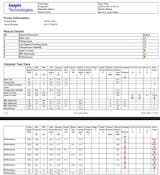The injector control pressure sensor may be a common engine management component on diesel engines. because the name suggests, it's an electronic sensor that monitors the fuel pressure flowing to the injector. Diesel engines require specially fine-tuned fuel mixtures because they believe pressure and temperature to ignite the fuel mixture instead of sparks. The injector control pressure sensor detects the pressure supplied to the injector and sends this signal to the pc in order that it are often adjusted to realize optimal performance and efficiency. When there's a drag with this sensor, the signal could also be affected, causing problems in vehicle performance.
1 The engine is difficult to start out
One of the primary symptoms of a possible problem with the injector control pressure sensor may be a problem with the engine starting. Diesel engines don't have a spark ignition, so a fine-tuned fuel mixture is required to properly ignite. If there's a drag with the control pressure sensor, the pc signal of the injector could also be interrupted, which can prevent your vehicle from starting. The engine may require more cranks than normal, or the key may have to be turned a couple of turns before starting. When this problem first occurs, it's going to take several attempts to start out the engine. But because the problem becomes more and more serious, it'll take more and more attempts to urge started. within the end, the engine couldn't start in the least.
2 Check whether the engine light is on
When the injector control pressure sensor is broken, the "check engine" red light on the dashboard could also be lit. If the pc detects a drag with the injector control pressure sensor OR circuit, it'll close up the "check engine light" to notify the driving force of the matter. The illuminated Check Engine indicator can also leave thanks to various other problems, so it's strongly recommended to scan the pc for fault codes.
P0190, P0191, P0192, P0193, and P0194 are the foremost common DTC codes that indicate a drag with the fuel rail sensor.
3 Poor fuel mileage, poor fuel economy
When the injector control pressure sensor fails to figure normally, you'll find that fuel economy and mileage are greatly reduced. The engine control unit sends an excessive amount of fuel to the combustion chamber through the fuel rail, or insufficient fuel is shipped. you'll quickly discover that there are more gasoline station trips and extra money to spend in your pocket. And cause an engine misfire, loss of power and acceleration, loss of fuel economy, and even stall in some cases. Other problems can also produce similar symptoms, so it's recommended to diagnose properly to verify the matter.
4 Weak acceleration, poor acceleration
When you tread on the accelerator and therefore the vehicle doesn't accelerate, needless to say, your injector control pressure sensor could also be damaged. The engine control unit cannot correctly transmit the signal from the signal to the equipment because the knowledge it obtains from the sensor isn't accurate. this suggests it'll not skills to satisfy the fuel demand on the engine.
5 Stopped The instrument cluster doesn't work
because the injector control pressure sensor deteriorates, engine stalls may occur. you're close to driving, then suddenly, the engine will stall. it's going to also stall when idling. this may make driving extremely difficult (dangerous) and will motivate you to require action thereon. Take the vehicle to the closest car shop immediately and replace the sensor just in case.
Injector control pressure sensors are more common in diesel engines, but also can be found on vehicles equipped with gasoline engines. If you think that there's a drag with the injector control pressure sensor, please ask a knowledgeable technician (such as a VEP DIESEL ENGINE PARTS technician) to examine the vehicle to work out whether the sensor should get replaced.



